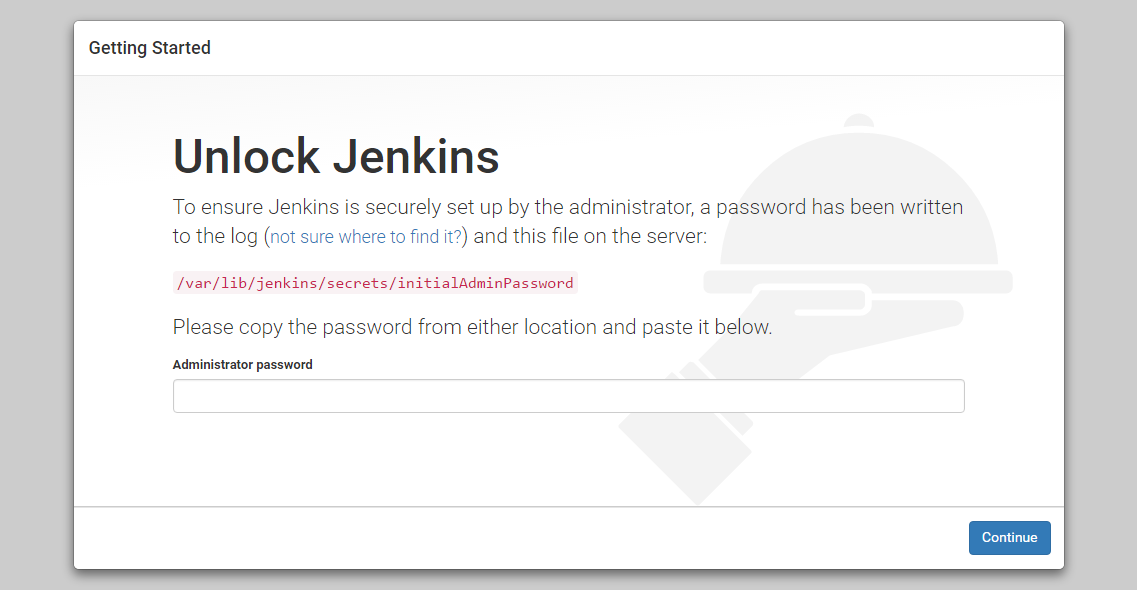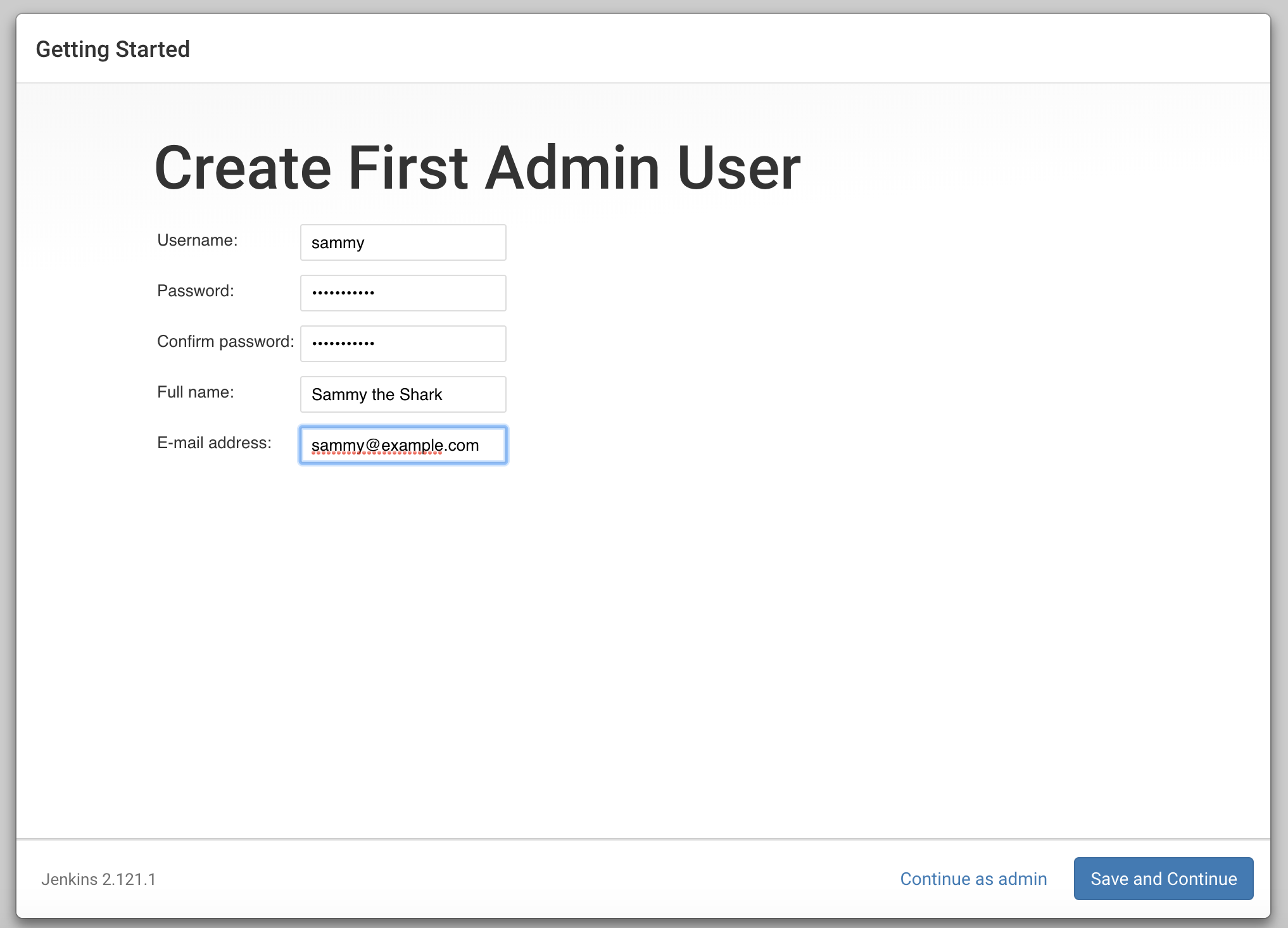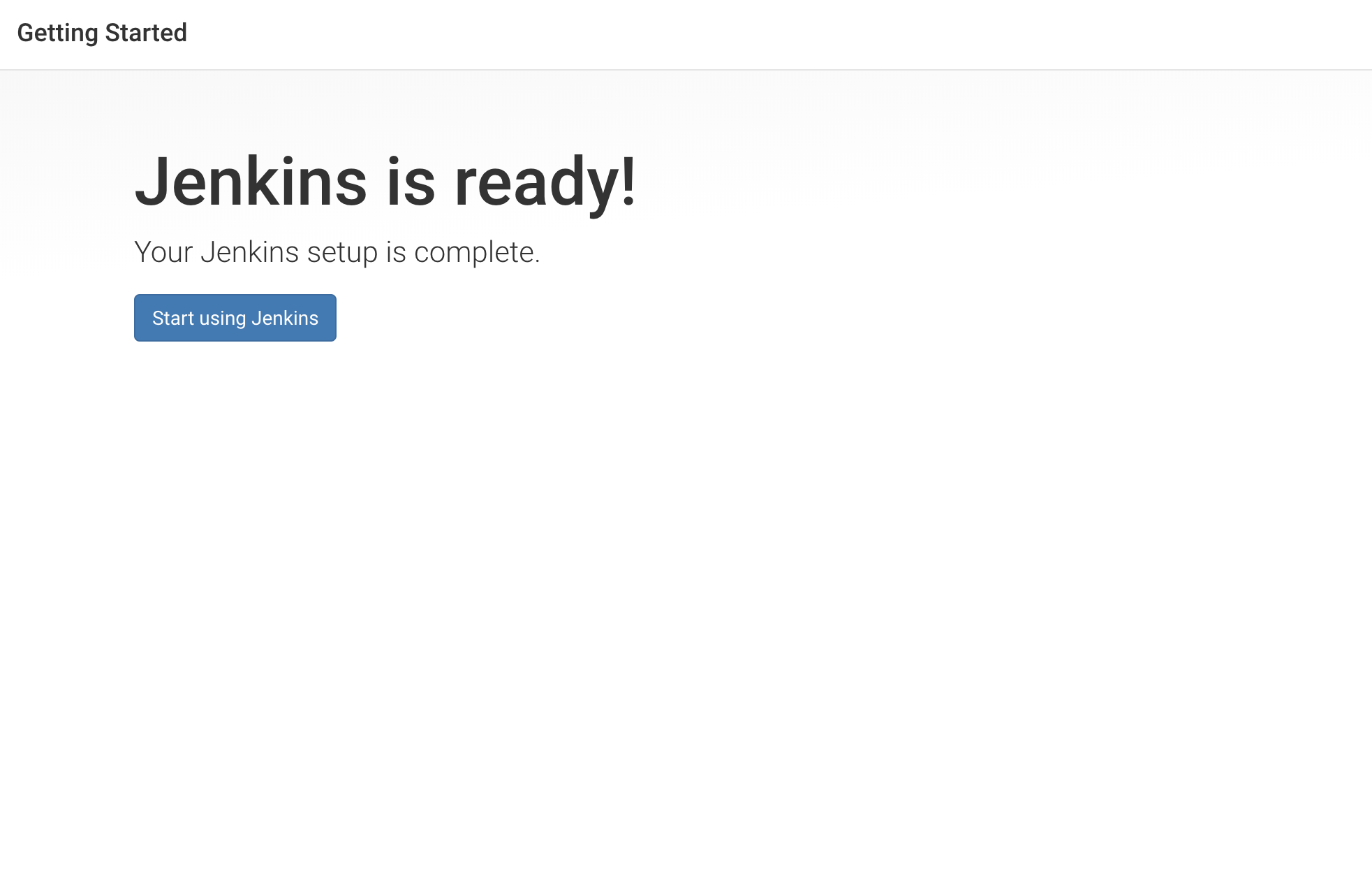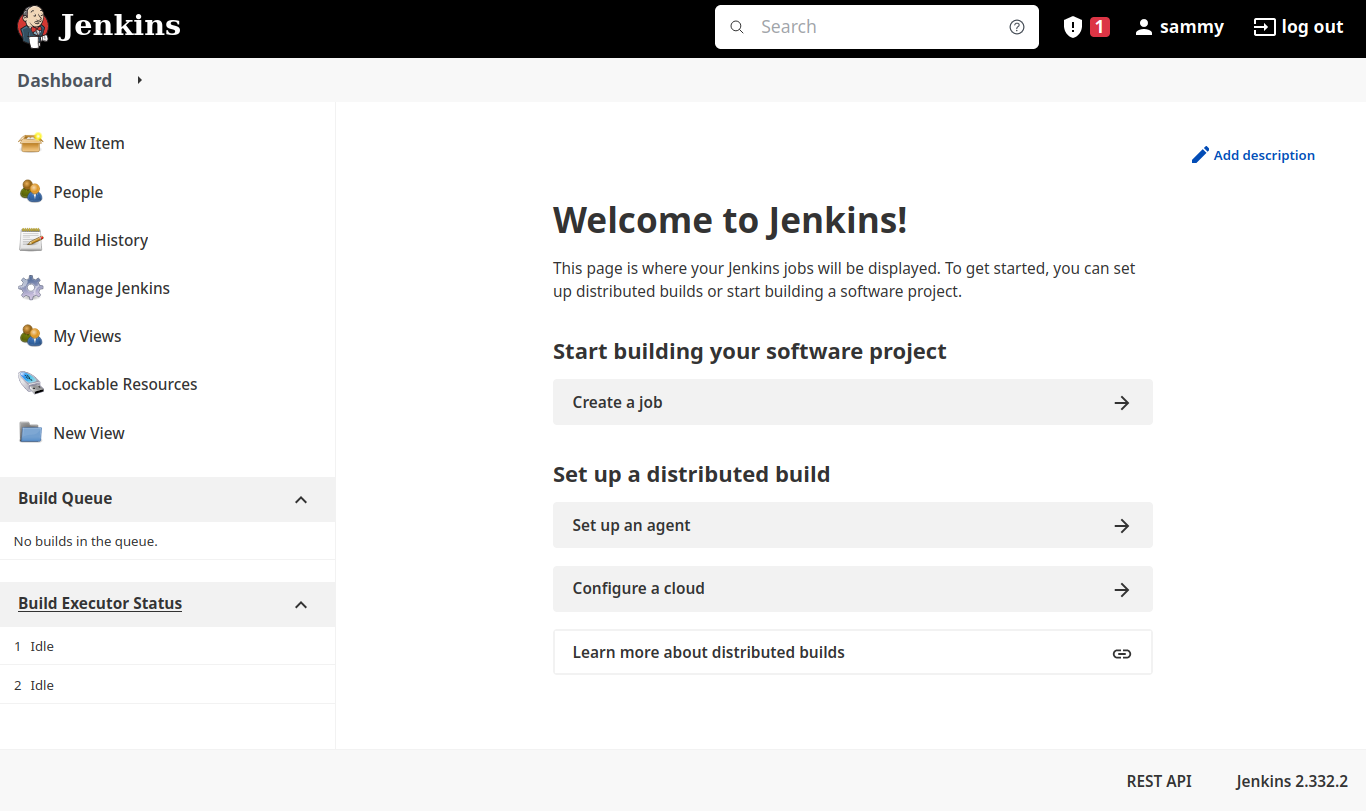- Log in to:
- Community
- DigitalOcean
- Sign up for:
- Community
- DigitalOcean
Not using Ubuntu 22.04?
Choose a different version or distribution.
Introduction
Jenkins is an open-source automation server that automates the repetitive technical tasks involved in the continuous integration and delivery of software. Jenkins is Java-based, installed from Ubuntu packages or by downloading and running its web application archive (WAR) file — a collection of files that make up a complete web application to run on a server.
In this tutorial you will install Jenkins on Ubuntu 22.04, start the development server and create an administrative user to get started exploring Jenkins automation. At the end of this tutorial you will have an unsecured Jenkins server ready for a development deployment. To secure your installation for production, follow the guide How to Configure Jenkins with SSL Using an Nginx Reverse Proxy on Ubuntu 22.04.
Prerequisites
To follow this tutorial, you will need:
- One Ubuntu 22.04 server configured with a non-root sudo user and firewall by following the Ubuntu 22.04 initial server setup guide. We recommend starting with at least 1 GB of RAM. Visit Jenkins’s “Hardware Recommendations” for guidance in planning the capacity of a production-level Jenkins installation.
- Oracle JDK 11 installed, following our guidelines on installing specific versions of OpenJDK on Ubuntu 22.04.
Step 1 — Installing Jenkins
The version of Jenkins included with the default Ubuntu packages is often behind the latest available version from the project itself. To ensure you have the latest fixes and features, use the project-maintained packages to install Jenkins.
First, add the repository key to your system:
- wget -q -O - https://pkg.jenkins.io/debian-stable/jenkins.io.key |sudo gpg --dearmor -o /usr/share/keyrings/jenkins.gpg
The gpg --dearmor command is used to convert the key into a format that apt recognizes.
Next, let’s append the Debian package repository address to the server’s sources.list:
- sudo sh -c 'echo deb [signed-by=/usr/share/keyrings/jenkins.gpg] http://pkg.jenkins.io/debian-stable binary/ > /etc/apt/sources.list.d/jenkins.list'
The [signed-by=/usr/share/keyrings/jenkins.gpg] portion of the line ensures that apt will verify files in the repository using the GPG key that you just downloaded.
After both commands have been entered, run apt update so that apt will use the new repository.
- sudo apt update
Finally, install Jenkins and its dependencies:
- sudo apt install jenkins
Now that Jenkins and its dependencies are in place, we’ll start the Jenkins server.
Step 2 — Starting Jenkins
now that Jenkins is installed, start it by using systemctl:
sudo systemctl start jenkins.service
Since systemctl doesn’t display status output, we’ll use the status command to verify that Jenkins started successfully:
- sudo systemctl status jenkins
If everything went well, the beginning of the status output shows that the service is active and configured to start at boot:
Output● jenkins.service - Jenkins Continuous Integration Server
Loaded: loaded (/lib/systemd/system/jenkins.service; enabled; vendor preset: enabled)
Active: active (running) since Mon 2022-04-18 16:07:28 UTC; 2min 3s ago
Main PID: 88180 (java)
Tasks: 42 (limit: 4665)
Memory: 1.1G
CPU: 46.997s
CGroup: /system.slice/jenkins.service
└─88180 /usr/bin/java -Djava.awt.headless=true -jar /usr/share/java/jenkins.war --webroot=/var/cache/jenkins/war --httpPort=8080
Now that Jenkins is up and running, adjust your firewall rules so that you can reach it from a web browser to complete the initial setup.
Step 3 — Opening the Firewall
To set up a UFW firewall, visit Initial Server Setup with Ubuntu 22.04, Step 4- Setting up a Basic Firewall. By default, Jenkins runs on port 8080. Open that port using ufw:
- sudo ufw allow 8080
Note: If the firewall is inactive, the following commands will allow OpenSSH and enable the firewall:
- sudo ufw allow OpenSSH
- sudo ufw enable
Check ufw’s status to confirm the new rules:
- sudo ufw status
You’ll notice that traffic is allowed to port 8080 from anywhere:
OutputStatus: active
To Action From
-- ------ ----
OpenSSH ALLOW Anywhere
8080 ALLOW Anywhere
OpenSSH (v6) ALLOW Anywhere (v6)
8080 (v6) ALLOW Anywhere (v6)
With Jenkins installed and a firewall configured, you have completed the installation stage and can continue with configuring Jenkins.
Step 4 — Setting Up Jenkins
To set up your installation, visit Jenkins on its default port, 8080, using your server domain name or IP address: http://your_server_ip_or_domain:8080
You should receive the Unlock Jenkins screen, which displays the location of the initial password:

In the terminal window, use the cat command to display the password:
- sudo cat /var/lib/jenkins/secrets/initialAdminPassword
Copy the 32-character alphanumeric password from the terminal and paste it into the Administrator password field, then click Continue.
The next screen presents the option of installing suggested plugins or selecting specific plugins:

We’ll click the Install suggested plugins option, which will immediately begin the installation process.

When the installation is complete, you’ll be prompted to set up the first administrative user. It’s possible to skip this step and continue as admin using the initial password from above, but we’ll take a moment to create the user.
Note: The default Jenkins server is NOT encrypted, so the data submitted with this form is not protected. Refer to How to Configure Jenkins with SSL Using an Nginx Reverse Proxy on Ubuntu 22.04 to protect user credentials and information about builds that are transmitted via the web interface.

Enter the name and password for your user:

You’ll receive an Instance Configuration page that will ask you to confirm the preferred URL for your Jenkins instance. Confirm either the domain name for your server or your server’s IP address:

After confirming the appropriate information, click Save and Finish. You’ll receive a confirmation page confirming that “Jenkins is Ready!”:

Click Start using Jenkins to visit the main Jenkins dashboard:

At this point, you have completed a successful installation of Jenkins.
Conclusion
In this tutorial, you installed Jenkins using the project-provided packages, started the server, opened the firewall, and created an administrative user. At this point, you can start exploring Jenkins.
When you’ve completed your exploration, follow the guide How to Configure Jenkins with SSL Using an Nginx Reverse Proxy on Ubuntu 22.04 to protect your passwords, as well as any sensitive system or product information that will be sent between your machine and the server in plain text to continue using Jenkins.
To learn more about what you can do using Jenkins, check out other tutorials on the subject:
Thanks for learning with the DigitalOcean Community. Check out our offerings for compute, storage, networking, and managed databases.
About the author
Still looking for an answer?
This textbox defaults to using Markdown to format your answer.
You can type !ref in this text area to quickly search our full set of tutorials, documentation & marketplace offerings and insert the link!
This comment has been deleted
$ sudo apt-get install jenkins
Reading package lists… Done
Building dependency tree… Done
Reading state information… Done
The following additional packages will be installed:
net-tools
The following NEW packages will be installed:
jenkins net-tools
0 upgraded, 2 newly installed, 0 to remove and 0 not upgraded.
Need to get 87.6 MB/87.8 MB of archives.
After this operation, 92.1 MB of additional disk space will be used.
Do you want to continue? [Y/n] Y
Ign:1 https://pkg.jenkins.io/debian-stable binary/ jenkins 2.346.3
Ign:1 https://pkg.jenkins.io/debian-stable binary/ jenkins 2.346.3
Ign:1 https://pkg.jenkins.io/debian-stable binary/ jenkins 2.346.3
Err:1 https://pkg.jenkins.io/debian-stable binary/ jenkins 2.346.3
Cannot initiate the connection to mirrors.tuna.tsinghua.edu.cn:443 (2402:f000:1:400::2). - connect (101: Network is unreachable) Could not connect to mirrors.tuna.tsinghua.edu.cn:443 (101.6.15.130), connection timed out
E: Failed to fetch https://mirrors.tuna.tsinghua.edu.cn/jenkins/debian-stable/jenkins_2.346.3_all.deb Cannot initiate the connection to mirrors.tuna.tsinghua.edu.cn:443 (2402:f000:1:400::2). - connect (101: Network is unreachable) Could not connect to mirrors.tuna.tsinghua.edu.cn:443 (101.6.15.130), connection timed out
E: Unable to fetch some archives, maybe run apt-get update or try with --fix-missing?
Hello team,
I just follow the process to install Jenkins on Ubuntu 22.04 LTS & and i faced an below ERROR:
E: The repository ‘http://pkg.jenkins.io/debian-stable binary/ Release’ is not signed."
For that please update the “repository key” and “sources.list” step into installation process
I have found that Solution on Jenkins official site https://www.jenkins.io/blog/2023/03/27/repository-signing-keys-changing/
Thanks…!!
Hello Team,
I just follow your steps to install jenkins on UBUNTU 22.04 LTS
I have found that I got an ERROR “E: The repository ‘http://pkg.jenkins.io/debian-stable binary/ Release’ is not signed.”
So, have found solution that keys are changes from the official jenkins side
Here I am providing link for that … please refer this and update on this tutorial as well… Thank you …
Link: https://www.jenkins.io/blog/2023/03/27/repository-signing-keys-changing/
Had errors that I’ve been unable to solve while trying to start Jenkins.
$ sudo service jenkins start
Job for jenkins.service failed because the control process exited with error code.
See "systemctl status jenkins.service" and "journalctl -xeu jenkins.service" for details.
Service Status
$ systemctl status jenkins.service
● jenkins.service - Jenkins Continuous Integration Server
Loaded: loaded (/lib/systemd/system/jenkins.service; enabled; vendor preset: enabled)
Active: activating (auto-restart) (Result: exit-code) since Tue 2023-09-26 16:43:15 PST; 9ms ago
Process: 19094 ExecStart=/usr/bin/jenkins (code=exited, status=1/FAILURE)
Main PID: 19094 (code=exited, status=1/FAILURE)
CPU: 1.939s
Journal
~
~
~
~
~
~
~
~
~
~
~
~
~
~
~
~
~
~
~
~
~
~
~
-- No entries --
Java Version
$ java --version
openjdk 11.0.20.1 2023-08-24
OpenJDK Runtime Environment (build 11.0.20.1+1-post-Ubuntu-0ubuntu122.04)
OpenJDK 64-Bit Server VM (build 11.0.20.1+1-post-Ubuntu-0ubuntu122.04, mixed mode, sharing)
This is right after sudo apt install jenkins. It simply fails to start and I’m not sure what’s going on.
this is great walk through!
however I stuck for a few hours because I started my droplet on Ubuntu 23 (not 22 as the tutorial states)
and the pgp keys did not match, you need to go for
sudo wget -O /usr/share/keyrings/jenkins-keyring.asc \ [https://pkg.jenkins.io/debian-stable/jenkins.io-2023.key](https://pkg.jenkins.io/debian-stable/jenkins.io-2023.key)
echo deb [signed-by=/usr/share/keyrings/jenkins-keyring.asc] \ https://pkg.jenkins.io/debian-stable binary/ | sudo tee \ /etc/apt/sources.list.d/jenkins.list > /dev/null
For Unbuntu 24
curl -fsSL https://pkg.jenkins.io/debian-stable/jenkins.io-2023.key | sudo tee \
/usr/share/keyrings/jenkins-keyring.asc > /dev/null
echo deb [signed-by=/usr/share/keyrings/jenkins-keyring.asc] \
https://pkg.jenkins.io/debian-stable binary/ | sudo tee \
/etc/apt/sources.list.d/jenkins.list > /dev/null
otherwise - I get
Error: The repository ‘http://pkg.jenkins.io/debian-stable all Release’ does not have a Release file.
https://www.jenkins.io/blog/2023/03/27/repository-signing-keys-changing/
- Table of contents
- Introduction
- Step 1 — Installing Jenkins
- Step 2 — Starting Jenkins
- Step 3 — Opening the Firewall
- Step 4 — Setting Up Jenkins
- Conclusion
Deploy on DigitalOcean
Click below to sign up for DigitalOcean's virtual machines, Databases, and AIML products.
Become a contributor for community
Get paid to write technical tutorials and select a tech-focused charity to receive a matching donation.
DigitalOcean Documentation
Full documentation for every DigitalOcean product.
Resources for startups and SMBs
The Wave has everything you need to know about building a business, from raising funding to marketing your product.
Get our newsletter
Stay up to date by signing up for DigitalOcean’s Infrastructure as a Newsletter.
New accounts only. By submitting your email you agree to our Privacy Policy
The developer cloud
Scale up as you grow — whether you're running one virtual machine or ten thousand.
Get started for free
Sign up and get $200 in credit for your first 60 days with DigitalOcean.*
*This promotional offer applies to new accounts only.
